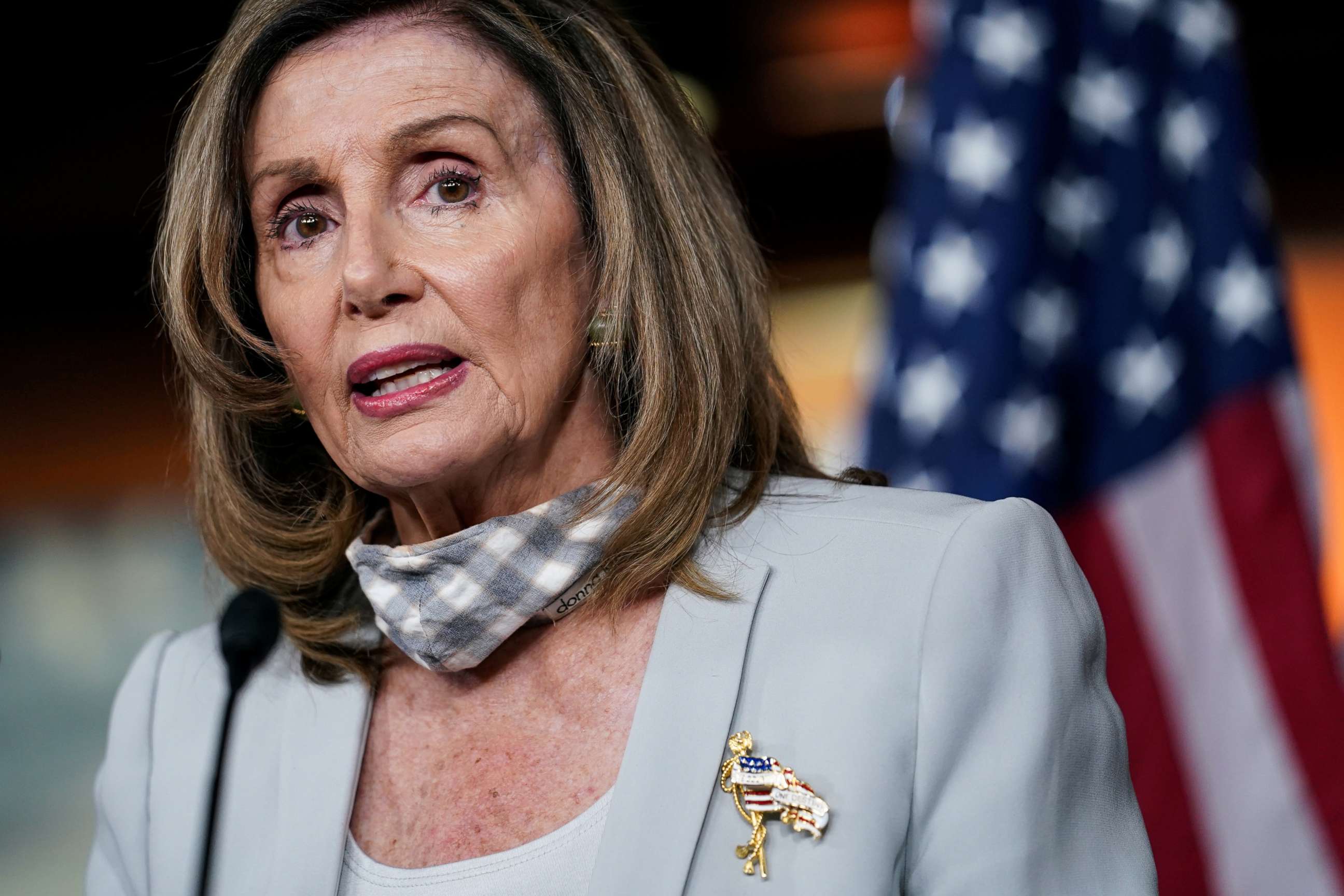Pelosi outlines 48-hour deadline to pass relief bill before election
Completing the coronavirus deal, "depends on the administration," she said.
House Speaker Nancy Pelosi said Sunday that she and the Trump administration still haven't reached an agreement on coronavirus relief, and that a deal must be struck in the next 48 hours if they want to pass the package by Election Day -- just 16 days away.
On ABC's "This Week," Pelosi put the onus to complete the deal on the White House when pressed by Chief Anchor George Stephanopoulos, saying its success "depends on the administration."
"We don't have agreement in the language yet, but I'm hopeful," the speaker said. "I'm optimistic because, again, we’ve been back and forth on all of this."
Pelosi and Treasury Secretary Steven Mnuchin have been negotiating for months to reach a deal on another coronavirus relief package. The Democratic-led House passed a $3 trillion relief package in May that did not progress in the Senate, and recently the White House offered a $1.8 trillion compromise, while Trump has said he wants to pass a "a big, beautiful stimulus."
However on "This Week," Pelosi noted that the impasse was not solely related to the legislation's price tag.
"The testing. The tracing. The treatment. The mask-wearing. The separation. The sanitation. And all that goes with it," she said, later adding that she wanted more specific details on both national and state strategies and a guarantee that the Centers for Disease Control and Prevention would "provide guidance."
Stephanopoulos further noted that Senate Majority Leader Mitch McConnell has said he wouldn't bring a compromise package of $1.8 trillion to the Senate floor. The Republican from Kentucky has announced that he plans to call a vote this week on a $500 billion bill.
"So what happens?" Stephanopoulos asked the House speaker.
"He said a number of things and one of the things that he said ... it was reported yesterday, that if the White House and the House come to an agreement that he would put it on the floor," Pelosi said.
The continued impasse comes as an estimated 8 million Americans have fallen into poverty since May, according to Columbia University researchers. There have been 898,000 new unemployment claims filed in this -- the 30th straight week of historically high unemployment claims during the pandemic.
In order to bridge the remaining gaps, Stephanopoulos asked Pelosi if she would reach out directly to Trump, with whom she has had no contact during the pandemic.
"You haven’t spoken to the president in over a year. Are you willing to pick up the phone to close a deal to get this done?" pressed Stephanopoulos.
"This is not a casual conversation," Pelosi said. "This is about a meeting of the head of the first branch of government, the legislative branch, and the president. If there is a purpose, if it -- if there is a stipulation of trying to get something done, then perhaps we take this to that place when we can't solve other problems."

On "This Week," Stephanopoulos also asked Pelosi about the Supreme Court confirmation process for Judge Amy Coney Barrett, noting that she previously alluded to strategies to halt Barrett's elevation to the court -- something that appears increasingly unlikely.
"Last time we spoke, you said Democrats had arrows in their quiver to block this nomination. But she seems on a path of confirmation right now." Stephanopoulos said. "Is this a done deal or is there still something Democrats can do to stop it?
"Well, we’ll see … I’m not in the Senate," the speaker said. "What I’m talking about is how we win this election, because we have to offset ... whatever this court may do."
Pelosi also criticized Trump's rhetoric aimed at Michigan Gov. Gretchen Whitmer, who was the target of an alleged kidnapping plot recently uncovered by the FBI. During a Michigan rally Saturday, the president downplayed that threat and echoed a supporter-led chant of "lock her up" -- a phrase used during the 2016 campaign in reference to Hillary Clinton. Whitmer and members of her staff say the negative attention spurred by the president leads to spikes in threats aimed at the governor.
"The president has to realize that the words of the president of the United States weigh a ton," Pelosi said. "And, in our political dialogue, to inject fear tactics into it, especially a woman governor and her family, is so irresponsible."




